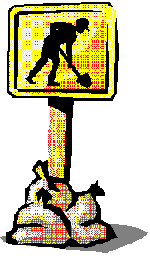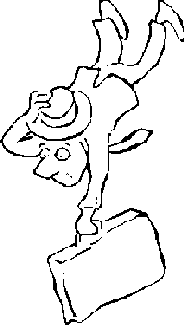Last Updated: May 28, 2006
INFORMATION ABOUT
PERSONAL INJURY CLAIMS
![]()
Each year, thousands of people get hurt. Some are injured while driving their cars; others slip and fall while walking; and still others are hurt while working. If you're hurt because someone else was careless or negligent, you may have a claim against the negligent person for the personal injuries you suffer.
We hope that the questions and answers presented here will assist you in familiarizing yourself with the issues and terms of Personal Injury cases. While the material below attempts to answer common questions in this area, State and local laws may significantly modify the facts set forth. Because all legal problems are unique, nothing provided here is a substitute for the advice of competent counsel. We strongly urge you to consult with an attorney licensed to practice in your state about any particular legal problem you may have.

CAN I ALWAYS RECOVER MONEY IF I AM HURT?
![]() No.
The law imposes upon each person a duty to conduct his or her affairs in a safe
manner. The person whose
No.
The law imposes upon each person a duty to conduct his or her affairs in a safe
manner. The person whose  carelessness or negligence
causes another's injury is called a "tortfeasor." If because of the
tortfeasor's actions you get hurt, the tortfeasor must compensate you for your
injuries. However, if you are hurt through your own inattention or
carelessness, you cannot recover money from someone else. So for example, if
you are walking in the evening and fall in an unmarked hole your neighbor dug
in his sidewalk, your neighbor may be obligated to pay you for your injuries.
On the other hand, if while you are walking down the street you are distracted
by a shiny new car passing by and walk into the side of a building, your
injuries were not caused by a tortfeasor's actions - so you cannot recover in
that event for any injuries you suffer.
carelessness or negligence
causes another's injury is called a "tortfeasor." If because of the
tortfeasor's actions you get hurt, the tortfeasor must compensate you for your
injuries. However, if you are hurt through your own inattention or
carelessness, you cannot recover money from someone else. So for example, if
you are walking in the evening and fall in an unmarked hole your neighbor dug
in his sidewalk, your neighbor may be obligated to pay you for your injuries.
On the other hand, if while you are walking down the street you are distracted
by a shiny new car passing by and walk into the side of a building, your
injuries were not caused by a tortfeasor's actions - so you cannot recover in
that event for any injuries you suffer.
IF I'M INJURED THROUGH SOMEONE ELSE'S NEGLIGENCE, WHAT DAMAGES CAN I RECOVER?
![]() You
may recover for all the damages you suffered as a result of your injury. This
includes the cost of your medical treatment, any lost wages or other income
while you are getting better and lost future wages or income if you can't go
back to your old job or can no longer work at all because of the accident. In
addition to these economic losses, you may recover non-economic losses. These
include the pain and suffering you experience as a result of your injuries, and
the loss of the enjoyment of life's pleasures. In some states your spouse is allowed to
recover for his or her loss of your companionship. Depending on your
circumstances at the time of your injury and the severity of the injury, you
may be able to recover for other losses as well.
You
may recover for all the damages you suffered as a result of your injury. This
includes the cost of your medical treatment, any lost wages or other income
while you are getting better and lost future wages or income if you can't go
back to your old job or can no longer work at all because of the accident. In
addition to these economic losses, you may recover non-economic losses. These
include the pain and suffering you experience as a result of your injuries, and
the loss of the enjoyment of life's pleasures. In some states your spouse is allowed to
recover for his or her loss of your companionship. Depending on your
circumstances at the time of your injury and the severity of the injury, you
may be able to recover for other losses as well.
WHAT IS COMPARATIVE NEGLIGENCE?
![]() On
some occasions you may be partly responsible for your injuries. For example, a
homeowner may not have completely
On
some occasions you may be partly responsible for your injuries. For example, a
homeowner may not have completely  cleaned the ice and snow
from the sidewalk in front of his or her home. While walking on the sidewalk,
you slip on the ice and break your arm. However, if you had been paying more
attention to where you were walking when you fell, you would have seen a clear
path that you could have used. In this situation, a jury may determine that
both you and the homeowner were negligent. The jury may find that comparatively,
you were 30% at fault and the homeowner 70% at fault. If the jury had awarded
$10,000.00 to you, your award would then be reduced by 30% since you were
partially responsible for your injuries. So you would receive only $7,000.00
instead of the full $10,000.00. If the jury finds that you are 51% responsible,
you will not recover in Pennsylvania. Each state's law is somewhat different.
cleaned the ice and snow
from the sidewalk in front of his or her home. While walking on the sidewalk,
you slip on the ice and break your arm. However, if you had been paying more
attention to where you were walking when you fell, you would have seen a clear
path that you could have used. In this situation, a jury may determine that
both you and the homeowner were negligent. The jury may find that comparatively,
you were 30% at fault and the homeowner 70% at fault. If the jury had awarded
$10,000.00 to you, your award would then be reduced by 30% since you were
partially responsible for your injuries. So you would receive only $7,000.00
instead of the full $10,000.00. If the jury finds that you are 51% responsible,
you will not recover in Pennsylvania. Each state's law is somewhat different.
WHAT SHOULD I DO IF I'M HURT BECAUSE SOMEONE WAS NEGLIGENT?
![]() You
should NOT talk with other people about the incident until you have had the
opportunity to speak with your attorney. If you require medical treatment, you
should obtain it as soon as possible and advise the doctor of the fact that you
had an accident, giving him or her a complete description of any injuries you
sustained. If you cannot work because of your injuries, make sure your employer
understands that your absence is as a result of the injuries you received in
the
You
should NOT talk with other people about the incident until you have had the
opportunity to speak with your attorney. If you require medical treatment, you
should obtain it as soon as possible and advise the doctor of the fact that you
had an accident, giving him or her a complete description of any injuries you
sustained. If you cannot work because of your injuries, make sure your employer
understands that your absence is as a result of the injuries you received in
the  accident. As soon after
the incident as possible, you should make a complete record of all the
circumstances of your injury. This should include the date, time and location
of the accident, the names, addresses and phone numbers of any witnesses. We
strongly suggest that if it is at all possible, you take photographs of the
accident scene and of your injuries. We suggest that you keep track of all of the problems you have
because of the injury in one place, such as in a notebook or diary. This should
include the names, addresses and telephone numbers of your doctors and a daily
description of the problems caused in your life because of the accident. Be very detailed and list every small thing that causes you pain. If you
fail to keep a diary, it will be too easy for you to forget many of the
problems you had.
accident. As soon after
the incident as possible, you should make a complete record of all the
circumstances of your injury. This should include the date, time and location
of the accident, the names, addresses and phone numbers of any witnesses. We
strongly suggest that if it is at all possible, you take photographs of the
accident scene and of your injuries. We suggest that you keep track of all of the problems you have
because of the injury in one place, such as in a notebook or diary. This should
include the names, addresses and telephone numbers of your doctors and a daily
description of the problems caused in your life because of the accident. Be very detailed and list every small thing that causes you pain. If you
fail to keep a diary, it will be too easy for you to forget many of the
problems you had.
IS THERE A TIME LIMIT IN WHICH ONE HAS TO BRING A PERSONAL INJURY LAWSUIT?
![]() Yes,
each state has its own "statute of limitations" which is the time in
which you must bring a lawsuit. Since each jurisdiction has its own statute of
limitations, you must make sure you sue before the statute of limitations has
passed. Statutes of limitations vary from state to state so you should consult
with an attorney as soon as possible after the accident.
Yes,
each state has its own "statute of limitations" which is the time in
which you must bring a lawsuit. Since each jurisdiction has its own statute of
limitations, you must make sure you sue before the statute of limitations has
passed. Statutes of limitations vary from state to state so you should consult
with an attorney as soon as possible after the accident.
DO I NEED AN ATTORNEY?
![]() Yes.
If the tortfeasor is insured, soon after the accident you will be contacted by
a representative of his or her insurance company. This person, known as an
"adjuster," will ask you about the accident with a view toward
minimizing any payment that the insurance company may later have to make. If
you attempt to deal with the insurance adjuster on your own, you will probably
not receive full compensation for your injuries. An experienced attorney will
make sure that all the facts are presented in your favor and that you receive a
fair and equitable settlement.
Yes.
If the tortfeasor is insured, soon after the accident you will be contacted by
a representative of his or her insurance company. This person, known as an
"adjuster," will ask you about the accident with a view toward
minimizing any payment that the insurance company may later have to make. If
you attempt to deal with the insurance adjuster on your own, you will probably
not receive full compensation for your injuries. An experienced attorney will
make sure that all the facts are presented in your favor and that you receive a
fair and equitable settlement.
HOW IS MY ATTORNEY PAID?
![]() Personal
Injury cases are normally handled on a contingent fee basis. This means that
your attorney's fee will be a percentage of the amount recovered on your
behalf. If there is no recovery, you will not owe your attorney any fee. Many
attorneys will advance the costs necessary to bring your case to trial, which
means you won't have to pay money to your lawyer in order to have the lawsuit
filed. If there is a recovery, your attorney will be reimbursed for any
advanced costs out of the recovery. If there is no recovery, most attorneys
will expect you to pay back the advanced costs. As in all cases where you
retain an attorney, you should agree in writing to the fee arrangements before
any work is done on your case.
Personal
Injury cases are normally handled on a contingent fee basis. This means that
your attorney's fee will be a percentage of the amount recovered on your
behalf. If there is no recovery, you will not owe your attorney any fee. Many
attorneys will advance the costs necessary to bring your case to trial, which
means you won't have to pay money to your lawyer in order to have the lawsuit
filed. If there is a recovery, your attorney will be reimbursed for any
advanced costs out of the recovery. If there is no recovery, most attorneys
will expect you to pay back the advanced costs. As in all cases where you
retain an attorney, you should agree in writing to the fee arrangements before
any work is done on your case.
If you or someone you know believe they have been injured through someone else's negligence, a DESSEN, MOSES & ROSSITTO attorney will be happy to review the facts of the incident. Just press the button below to submit a factual history form.
If you have other questions or comments about the area of Personal Injury or any other area in which we practice, please send us an E-mail message with your questions or comments and we will be happy to try to assist you.
![]()
LINKS TO OTHER INTERESTING INFO
Consumer Product Safety Commission
Occupational Health and Safety
Administration (OSHA)
![]()
Top of Page | DM&R Home Page
| Legal Article Wall
About DM&R | To Retain
DM&R | Ask Us A Question
![]()
Copyright © 1996 -
2006 Dessen, Moses & Rossitto
All rights reserved.



